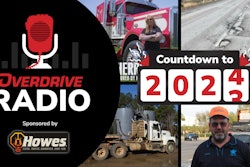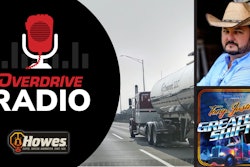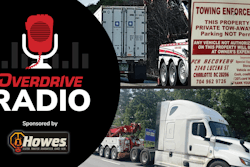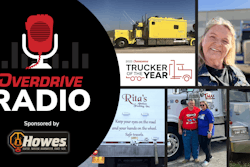This time around, just more than a quarter of owners expected things to continue to get worse for their businesses.
In this week's edition of Overdrive Radio, contributor, former OTR owner and business coach Gary Buchs offers independents a variety of New Year's Resolutions to get back to basics in recordkeeping and predictable and preventive maintenance, to focus on costs before revenue and find ways to save. They're applicable whether you’re expecting a worse year or if you’re one of the just 16% of respondents who are optimistic for improvement.
The plurality of voters in our business-conditions polling, as you can see above, expected similar performance transitioning from 2023 to 2024. Depending on whether you’re in one or the other of two categories of owner-operator Buchs sees today -- the haves or the have-nots -- could be the difference between your own sense of optimism or pessimism, I imagine.

[Related: How truck dealers felt about the 2024 equipment reflects freight demand outlook, more]
Yet the new year offers opportunity for all to reassess. Buchs urged first and foremost an awareness of your own psychology, particularly when it comes to unusually dire or, otherwise, rosy prognostications over the airwaves and bytes hammering away at the brain day in and day out.
And: Take full control of what you can control.
"People complain about the percentage that a broker might keep, but then we turn around and make moves where we tend to give away" more money, Buchs offered as an example. "We hire a dispatch service, which is like a broker, and we're handing as much as 10% more away to someone else." It could be $1,000 a month, easy, he added. "If you paid yourself for that time and did your own dispatching, you'd probably do a better job, I do believe that," though navigating the learning curve could take time.
[Related: How to change your decision-making for successful self-dispatch]
Best, though, you'll hold on to the money you were giving away.
"And then we factor," he said, particularly newer owners struggling with the time and cash-flow lag between moving loads and getting paid. That comes at a cost, too. "How many are giving away 15%-20% of their revenue, potentially, just through those two services?" Take a listen:
Three real-world trucking resolutions for 2024
As I note in the podcast, I reached out to our three Trucker of the Year finalists last week and asked for their own resolutions/goals for the new year.
Things were off to a good start for Veterans Transportation Services independent John Schiltz, who'd made good on tactics around customer engagement that Buchs also recommends, learning to really sell yourself in every interaction you have. Doing that yielded a new contract for Schiltz that should cover his and his wife Sarah's operation through much of this year’s first half. With it, they make good on a goal to avoid reliance for that half-year on spot RGN freight, work that's been hit and miss when it comes to rates this past year.
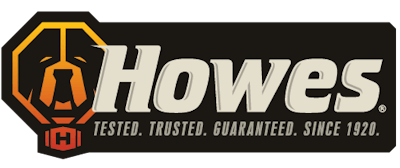 Overdrive Radio's sponsor is Howes, longtime provider of fuel treatments like its Howes Diesel Treat anti-gel and Lifeline rescue treatment to get you ready for winter, likewise its all-weather Diesel Defender, among other products.
Overdrive Radio's sponsor is Howes, longtime provider of fuel treatments like its Howes Diesel Treat anti-gel and Lifeline rescue treatment to get you ready for winter, likewise its all-weather Diesel Defender, among other products.
On a run out to Wyoming this past fall for a different customer, he found himself near a farm he’d delivered to for a direct seed customer in past. He took the opportunity to make a quick call to his contact there, near his home base in Wisconsin. It was a casual conversation, yet ultimately led to a discussion of the company’s transport needs during the coming year’s planting season. The Schiltzes and VTS now have their two trucks committed to the operation to haul seed outbound and empty reusable totes back.
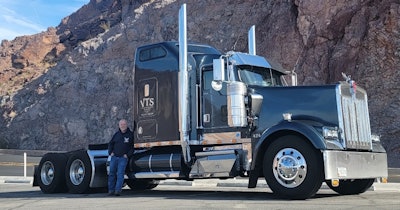 John Schiltz with his 1999 Kenworth
John Schiltz with his 1999 Kenworth
It's a fine example of taking control of planning and recognizing where demand is likely to be -- and where your past relationships can be brought to bear for success getting away from the fickle spot market. As the past decades have shown repeatedly, plenty brokers are willing to use the boards in pursuit of cut-rate work. That's been especially true over the last year. Yet others, Buchs emphasized, might have more dedicated opportunities, and your own planning and outreach work to solidify relationships with them could prove attractive, and plenty valuable, both to them and to you.
[Related: Work-life balance as an owner-operator: You have to build it]
Trucker of the Year finalist Jay Hosty's central partnership -- he's leased to Landstar -- will certainly continue into the new year, he said, and he'll also stay choosy about the freight he takes. Between Hosty and Tim and Shelley Pulli of Pulli Express, the third finalist, a theme of realism, of a fashion (one might say resignation instead), emerged looking out at the year ahead. As Hosty put it, if his freight choosiness means another slower-than-normal year for the business, and "if that means being home a lot more, I'll do that" and make the most of it.
His long-term frugality and laser-focus on containing costs has set him up well to weather the storm that is the ongoing competition the agents he works with are no doubt seeing from big brokerages and other carriers "driving the rates down," he said. "I’ll stick to trying to find the better paying loads" in the Landstar network.
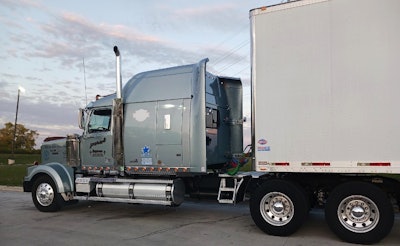 Jay Hosty's owned this 2006 Detroit-powered Western Star for 18 years.
Jay Hosty's owned this 2006 Detroit-powered Western Star for 18 years.
He has another goal, too -- making good on plans to finish the build on what will be a retirement truck of sorts, a 2022 Western Star purchased as a daycab almost 2 years ago now. He's angling to put a 100-inch custom sleeper on it, and he's held out for just the right builder, at the right price, to do it.
As with Hosty, Shelley Pulli was bracing for a somewhat slower year, a challenge for the business, particularly given the Pullis brought in a new owner-operator leased on this past fall with a new tank trailer purchase. "There’s going to be a lot of competition out there," Shelley knows. "You can’t let anything slide. You have to really be on top of your game."
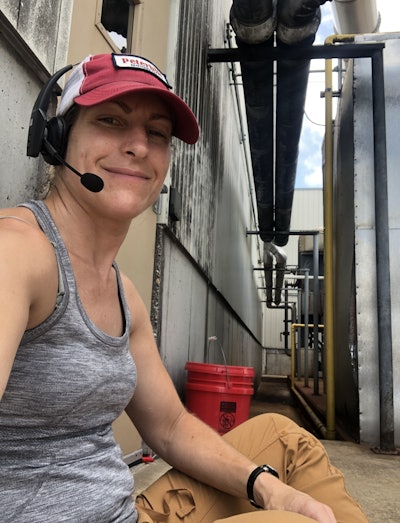 Shelly Pulli on-site at the end of a liquid-sugar delivery that is Pulli Express's bread and butter.
Shelly Pulli on-site at the end of a liquid-sugar delivery that is Pulli Express's bread and butter.
It may mean well less on-highway work for Shelley, she said, with the added owners and freight slowing a bit. The pair have sold one of their two spare trucks, saving a bit on insurance in the process in part of their bid to "adjust to the economy," she added.
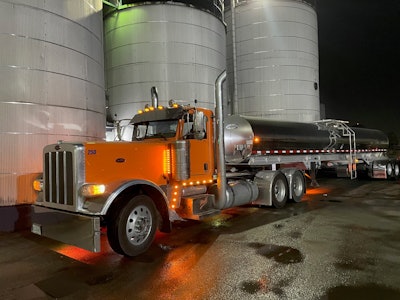 Shelley in June last year purchased this 2017 389 glider to replace her daily driver -- an International daycab the Pullis are holding onto as a spare.
Shelley in June last year purchased this 2017 389 glider to replace her daily driver -- an International daycab the Pullis are holding onto as a spare.
"I'm really excited" for the year, though, all told, Shelley said, with the addition of that 389 above in particular, even if she gets to run with it less herself. More work in the office, she feels, will help her "enjoy the family" the Pullis have around them, including four children, and to "enjoy the work," she added.
She'll make good on biz lessons learned after she followed her mother's example into her own previous real estate business, you can bet -- as our Trucker of the Month feature about the Pullis last March referenced as part of the inspiration for her switch to an S Corp structure for Pulli Express.
Kathy Vasquez, sadly, passed in October last year. "She was a really good Mom," Shelley said, and will certainly be missed.
[Related: Direct freight: Delivering a modicum of consistency in a turbulent market]
What's your New Year's Resolution for the business? What are you doing to make it reality? Drop us a comment or email me directly to weigh in.
Past stories mentioned throughout this week's Overdrive Radio podcast:
**Overdrive's split-sleeper explainer/tutorial
**Owner-operators' best negotiations tool: Right of refusal
**Matt Mickenberg's successful truck-purchase negotiation
**Parasitic costs: 15 ways to save
**A plan to thrive through the bottom of freight markets
**Red Eye Radio Partners in Business roundtable
Find more information on the ins and out of the owner-operator business, start to finish, in the Overdrive/ATBS-coproduced "Partners in Business" manual for new and established owner-operators, a comprehensive guide to running a small trucking business. Click here to download the most recent edition of the Partners in Business manual free of charge.
Gary Buchs: I think a lot of people are to the point where they're trying to play it safe a little bit, the haves and the have-nots is what I see too. Not everyone is losing money or has lost money.
Todd Dills: There is quite a bit more market pessimism among owner-operators in Overdrive's audience than optimism, that's sure at the start of this new year here. Welcome to 2024, I suppose. I'm Todd Dills, your Overdrive Radio host for this one featuring the voice of longtime former owner-operator Gary Buchs with what amounts to a series of potential New Year's resolutions for you looking at the year ahead, whether you're among the rough quarter of recent poll respondents who think the year's going to be worse than the tough one we just ended, or you're one of just 16% who are optimistic for improvement. The plurality of voters in that business conditions polling by contrast expected more of the same, depending on whether you are in one or the other of those categories you heard Gary Buchs delineate up top.
Gary Buchs: The haves and the have-nots.
Todd Dills: It could be the difference between optimism or pessimism, but in any case, the new year offers opportunity to reassess and I can think of no better individual out there to guide us through some thoughts and ideas than Buchs, who urged first and foremost in awareness of your own psychology as it were, particularly when it comes to unusually dire or otherwise rosy prognostications hammering away at the brain day in and day out.
Gary Buchs: Are our feelings in touch with reality of the market or our feelings interfering with our ability to consider new markets? That's part of what I see the fear to change.
Todd Dills: Talking to our finalists in the Trucker of the Year competition this week yielded something of a theme of resignation of banking on a slower year among some indeed, but also some bright spots in new customers or rather use of tactics similar to what Buchs recommends on the customer engagement front in this podcast, learning to really sell oneself in every interaction you have. Doing that yielded a new contract for one of our Trucker of the Year finalists that should cover the operation through much of this year's first half and avoid reliance for that half year on spot freight. There's a little indication we'll see much improvement in demand in trucker's favor there anytime soon. So for the owner-operator's New Year's resolutions this year, for Buchs, it's back to basics in his work. Coaching a variety of business owners to better performance.
Gary Buchs: Do your record keeping. If you don't do your record keeping and it doesn't have to be fancy, how are you going to know what it cost you first? Change your mindset from thinking revenue to cost first. Cost first, revenue second.
Todd Dills: You've got more control of costs.
Gary Buchs: You've got more control. But the other thing is if you think revenue first, you've boxed yourself in. So if you ask someone how much is something worth... Like that game show, The Price Is Right and they're guessing the prices and that they're out to win the game. It's an auction is what it is, but as a business owner, you've got more control over cost. You can control the accepted rate, but think cost first. Get your record system, keep it simple. Be aware of deductions on your settlements if you're a contractor. And if you're an independent, be aware of what is in that contract and what is missing. In other words, is detention clearly defined and when it'll be paid. A lot of complaints about arriving at the wrong time at the warehouse and then being back charged.
Todd Dills: Yep, big time. It's happening all the time.
Gary Buchs: Know those details, have them in writing and make sure they're acceptable for you rather than let the revenue override good sense. Over commitment is one of the things that happens when we're in a market like this because people feel the cashflow issues. So we over commit and well, I can get one more in. I can... Planning to reload right away after you make a delivery, unless you have a very good history of those two customers, I'd be very careful with that. Get a better handle on how to manage the hours of service so that you're not giving away time unnecessarily. Lost opportunity time is what I'm talking about.
The seven and three, the eight and two splits are... They're complicated. The math can feel complicated, but there are some tools out there.
Todd Dills: Since the 2020 change in the hours of service, the Split Sleeper is indeed more valuable as a tool, as long as you know how to use it. Find a link in the show notes wherever you're listening to Overdrive's own rundown of just how to understand new flexibilities there, particularly the ability of the shorter off-duty period in the split pair to stop that 14 hour clock.
Gary Buchs: You may want to look at planning for your loads a little bit backwards. In other words, you know you have to be home Friday afternoon or Saturday morning, you're leaving on Monday, start working your load planning from both ends rather than always looking at, well, what's my next load? What's my next load? That improves efficiency, I found quite a bit. And economic efficiency for an owner-operator is one of the most important things. It's the overall efficiency use of time and equipment. Don't ignore the maintenance, the predictable maintenance. That's the thing. It's not just preventative. We know alternators won't last forever or starters or batteries and belts and so on and so forth. Hoses, Bill [inaudible 00:06:29] sent me a picture. He had a hose with a crack in it. He was inspecting before he left home and he says, boy, if I wouldn't have seen that, that could have been $1000 plus bill on the side of the road to blow out your cooling. And I've had that happen and it is $1000 and it might be higher today.
Todd Dills: Biggest reason perennially that owner-operators fail, you got it, big maintenance failures. On the other side of a break we'll hear much more on that front, but also insight into Gary Book's read of the market and just where to find the money in it to make your own business more valuable to the customer and more. Keep tuned.
Speaker 4: Are freezing temps putting the brakes on your diesel engine? For unbeatable protection against diesel fuel jelling trust the experts at Howes products. Stock up on Howes diesel treat, the nation's most trusted anti gel. And to be safe from the harshest winter conditions, make sure you have Howes diesel lifeline on hand. The fastest acting gelling rescue product. Available nationwide. Howes products are designed to keep you rolling through the toughest conditions. Howes, tested, trusted, guaranteed. Visit howesproducts.com.
Todd Dills: That's H-O-W-E-S. Howesproducts.com. To get us rolling, Gary's answer to the question of, well just where can owner-operators find the money in today's market? Here's Gary.
Gary Buchs: One of the things that I learned after many years is I kind of identified that there's three types of freight that have value. What gives freight value is in my experience, is the value of the commodity in the trailer. Do you have a half a million dollars worth of freight in the trailer or do you have a load that is a raw commodity that has $10,000 worth of value? And so that really affects what you're going to be able to charge for revenue. The other one is the time factor with expedite or the need to quickly fill a need for a customer. There's value there and then the security because of the type of commodity with hazardous material or sensitive materials where you have to have team operations and so on. Those are kind of three primary areas of value.
And so you hear the truckers use the term, I found my niche market, and to find that niche, it's not always easy first off and it takes a lot of personal patience to work yourself in or to sell your services to one of those niche customers because... And I think patience is one of the things that a lot of truckers struggle with because of the overwhelming pressure of financial investment they've made or lack of cash on hand. That's a big problem. And as this market's gone on, that bleeding of cash that has occurred, mostly the owners I see that are struggling with the bleeding part, it's because of a breakdown and repair and so on.
It's not been fuel, it's not been even lack of loads, fewer loads has not been quite as much the issue as much as the breakdown. Just received a shop... An estimate from a client that I coached for a repair and it's like nothing you would normally think major, but we're looking at $12,000 bill and that's pretty common these days. So if you think about that, that's an extra $1000 a month. I try to present things to owners where if you take your money and you break it down into time factors... Well here's an example. Someone said the other day or asked about a one box...
Todd Dills: The single unit aftertreatment system in many freight liner trucks he means, called a one box because it houses both the diesel particulate filter and much of the selective catalytic reduction system that is in virtually all post 2010 trucks.
Gary Buchs: If you take the price of a one box, maybe it's 15,000 for that and you divide it by the half a million or 600,000 miles difference, you're talking about 2.5, 2.8 cents a mile for the life of that. It's a predictable thing. But managing that... Because of the truck maintenance issues, I'm actually seeing good steady business outcomes where owners who are leased with independent contractors, who are with companies that have more direct freight, that are using the walkaway lease basically like a truck rental and the reason they're being success... I think the reason they're successful is they may look like they're paying more upfront, but their cost in the end is at or less than many of the operators who are even trying to purchase a truck.
Todd Dills: Because maintenance is out of their hands, the maintenance is taken care of in the contract.
Gary Buchs: Right. They're prepaying the maintenance is what it kind of comes down to. And yeah, the big plus side is that if their truck is going to go in the shop for any amount of time, they can get another truck, not have to make payments on a truck sitting in the shop, so they can keep working if they choose to. And so that business model has shifted from a few years ago I think, and it's due to the time and the cost of repairs. If your plan is to trade trucks every three or four years, like many do, the walkaway lease may actually be better cost wise for you potentially. Everyone's at different, but I don't want to get too far off the market thing here.
One of the things I think about the market, what we're seeing is the prediction of a better market. It's like a can and the industry influencers just keep kicking that can down the road. And unfortunately what I see a little bit of because of social media pressure and media pressure is we keep kicking the can so that one day they feel like they can go on to their broadcast or whatever they're doing and say, hey look, I was right. But they predicted where that can would land every month for 10 months.
Todd Dills: And finally they got one right.
Gary Buchs: Finally, we got it. So when I think about the market turning in as far as volume, pricing and so on, I ask more why will the market turn? Why will we see an overall uplifting of rates? In other words, is the tide going to rise and lift the ship for everyone? My thoughts are I've never seen everyone be lifted. We're always going to have failures. We have the have and the have nots. We've got people, I'm looking at records of owners, single truck owners that are clearing over $100,000 in profit after all expenses and deductions. And then we have the ones who are basically hoping to get money to buy fuel almost it seems. But what's the difference? It's wide and it's varied. A lot of it's timing, a lot of it's luck, a lot of it is the ability to have extra resources, not so much... Savings are one thing, but having other sources of income, having a spouse or significant other that has income to cover home expenses, that is huge.
The home benefits and income that's provided by another, that really frees up people. Now the problem is does it free up owners who are struggling in a way that they will reverse bid prices down just to stay trucking? That's where we get in trouble in the market. A few years ago I wrote about, and there's, I don't remember the exact headline on the blog article we did about how the writer of refusal is our best negotiating tool.
Todd Dills: That title was "The Owner-operator's Number One Freight Negotiations Tool, Right of Refusal." Published April 27th, 2020 as the [inaudible 00:16:32] out during the early COVID lockdowns. There's more to it than just, no, I won't move for that rate though.
Gary Buchs: But we have to learn how to use that properly. More and more work on negotiating skills is one of the major things that I think owners could benefit by investing in the help to learn how to negotiate better.
Todd Dills: A lot of that has to do with just recognizing, I don't know, recognizing when you have leverage. I think about... This doesn't have anything to do with freight at all, but the story you wrote recently about Matthew Mickenberg and his shift early last year from basically a short... He had planned to trade his truck and when he was looking around at the price of a new truck early in the year, just didn't see how he could make it work. Interest rates had gone up, so his borrowing cost would be pretty high and just the overall price of the truck was huge. And then by shifting that strategy and putting off the decision, they didn't put off the decision, he made a decision to stick with what he had in terms of his truck. But fast-forward six, eight months, the landscape had changed such that he was able to get the price he wanted. And so he actually did make the move and he negotiated the long-term pretty effectively, just having waited for overall conditions in the truck market to turn his favor.
I think a lot has changed just over the last year in that arena, at least when it comes to equipment purchases as you alluded to. I think maintenance is still really high in terms of just the cost of getting work done if you're not doing it yourself, and then just the cost of parts and what have you. But some things have improved and I mean I think that's what that example shows is that there are some bright spots here in some areas of the business, if not in freight markets necessarily or not in all of them for sure. And how do you reckon that you have negotiating leverage when it comes to freight?
Gary Buchs: I think it begins with the whole approach to negotiating or when you contact someone or a customer for a rate contract. One of the things I'm learning, I'm always learning after years and years in business is I've really kind of tried to focus in a little bit more on defining things. In other words, defining what is negotiating, what is the rate, the cost? Defining what is that, defining what is it you need to do that day? One of the trends I'm picking up in the business is this, especially with all the social media. And the reason I bring that up is it's good and it's not so good. I don't want to say it's bad because I think all information is good, but it's speeding up people's reactions rather than planned actions. So when our influencers talk about, well, you need to have a business plan. So we say we have a business plan, but do we have a business plan? And if you are one of the owners that writes a business plan for this year, and I'm going to put it this way, odds are you have a plan in your head.
But that business plan, think about it when you watch... If you watch professional sports and you watch whether it's baseball, soccer, football, whatever, and they talk about game plans, they're constantly changing. When they start a game, they got two dozen game plans and depending on what the move by the competition is, they've got their move planned out. So when you're thinking about talking to a customer about negotiating a rate... And let's define a customer. A customer can be the broker, it can be the direct customer, it could be the shipper, it could be the receiver, it could be another third party in between. Again...
Todd Dills: It could be the carrier you're leased to.
Gary Buchs: Yeah, the carrier we're leased to and knowing the rules of the game, but also knowing who has the power to negotiate. That's part of it. And that's not always so easy to find out. So going forward in this year, those who take the time to... You don't have to write a big elaborate plan, but make yourself a few bullet points. So when you start thinking about your business plans, it's easy to talk about goals but make them realistic. For example, I've been trying to think about what focus should I be thinking about this year? And I've come up with getting back to basics because it seems like we have moved so fast and we've gone from... It's so easy to get a truck.
If you can sign your name, you can get a truck, they're going to take a risk on you. And unfortunately if you don't have some cash to back it up or a plan to back it up, it can be a very short-lived experience as we've mentioned in other interviews and things. But getting back to basics this year, really drilling down on being more frugal, being that predictable maintenance. One of the owners I've contact with wrote a message that their starter went out and they're on a... They haul high value stuff, so he hasn't shut his truck off for a week because he's afraid it won't start and he's getting ready to start a tour. So now he's going to have to replace the starter.
And if I remember right, if you're an owner and you start getting into these situations, predictable maintenance as I call them a little bit, there's right and wrong ways to help yourself there. For example, proper testing the starter, maybe it's not the starter, maybe it's the ground cable. I've seen that happen. But if you replace a starter, it's not just a starter. You may need to replace all the cables all the way back, new batteries. If you're in a situation, these are predictable things, just like the market can be predictable. So I wrote a note to my network group just yesterday, I think it was...
Todd Dills: That's the "Truck Business Network” Group on Facebook.
Gary Buchs: I try to encourage this, pull out your records if you're an owner and look back, if you can look back even more than one year, who are your customers and what were you hauling for the first quarter of this year and even going into the second quarter? What commodities that had more value did you haul in the spring? What is in demand? We've got agricultural products, we've got chemicals, we've got fertilizer, we've got horticulture things needed for the home centers, we've got the plants and all those supplies. We've got new construction beginning here very soon. You don't want to wait until the market has moved into those areas and start... If they start shipping the plants and you now think you're going to call and get the best deal to haul them, you're too late. You have to start contacting these customers a month or two ahead of time, whether it's... And work yourself... Pre-plan that account you want to work.
Todd Dills: That makes a lot of sense for somebody who long-term wants to take things to the next level. Look back at last year, the year before. Look at seasonal patterns that you've experienced. If you're somebody that's working through brokers, what have you hauled that engendered a good rate at that particular time of year and then next year comes around, we're in this new year now. Be proactive. Be in touch with those customers. Whether you continue to work with a broker or you've identified shippers with these products that potentially you could feel a need for, get in touch with them now before say the product is in demand coming here in March.
I was speaking with Gary Buchs Wednesday this week. The following day I had a conversation with one among our three Trucker of the Year finalists in Veterans Transportation Services independent, John Schultz, who's had an off and on customer and a seed company nearby to his home base in Wisconsin for six, seven years. I run out to Wyoming this past fall for a different customer. He found himself near a farm he delivered to for that direct seed customer in past and took the opportunity to get in touch with his contact there. Ultimately that simple conversation led to a discussion about the company's transport needs during coming years planting season, and owner-operator Schultz and his business partner and significant other, Sarah now have their two trucks committed to the operation. Only seed outbound and empty reusable totes back. The business will well fulfill something of a goal of his, at least for this year, getting away from spot market RGN work that has been so hit and miss when it comes to race this past year.
The seed work should take him all the way through the first half of the year and then it's back onto the vegetable harvest he's worked for several years now in the Midwest to close out 2024. It's a fun example of taking control, planning and recognizing where demand is likely to be and where your past relationships can be brought to bear for success, getting away from the fickle spot market. Plenty brokers are clearly willing to go there in pursuit of cut rate work in a time like the present. Yet others, Gary emphasized have more dedicated opportunities when your own pre-planning could prove attractive and plenty valuable to both them and to you.
Gary Buchs: Brokers with good customers, one of the things they don't like to do is wait till the last minute to have it [inaudible 00:27:38]. And I would book a lot of the best paying freight a month out or more. I would ask the broker, when do you get the orders? And they would tell me, I get the order two weeks, Tuesday, two weeks before they start shipping. Every week I get... Every Tuesday I get two weeks out or I get three weeks out or whatever. They wouldn't post the loads often until it got closer to shipping time, but I would call them Tuesday at noon and say, what do you have available? And they knew our routine and I'd say, just give me the... How many stops? I did multiple stops that paid well and say how many stops? Where does it finish and what's the gross dollar?
And I had done it enough that I could do the calculations for the profitability of that load, not base it wholly on gross dollars. Whatever formula works for you, start using a formula and then start making minor adjustments. Be very consistent so you measure what you're doing consistently. Now first quarter, we're already in the first quarter, so even start looking to go into the second quarter. I was sitting having coffee with this farm family from Iowa that has trucking and we were talking about the market a little bit and he goes, well, it's going to be a lot better year than I think most people believe because it's an election year. Politicians know that people vote with their pocketBuchs and I'm kind of thinking there's a chance we'll see some stimulus or something beginning the second half of the year. They'll kind of try to nudge people into a better mood than their personal bank accounts feel a little more flush and that could create some consumer demand for certain items and boost need for capacity. But until it happens, I wouldn't bank on it.
Todd Dills: Similar thoughts about election year potential for stimulus could be behind many of the freight forecasters. Look at 2024 and the prediction and nothing fundamental is likely to change about freight demand this year before the last quarter.
Gary Buchs: I think we're suffering from the overheating of the market. We're still in the hangover phase. A lot of newer owners, it almost feels a little bit like they look at a truck like it's a lottery ticket. They've been sold this idea that if they get a truck there's going to be a lot of gross dollars and so on. Last year the gross dollars didn't even appear it seems in many ways.
Todd Dills: For a lot of them, the rosy promises may have been true there for a little while and now we're back to the real world.
It's that New Year's resolution of a fashion Buchs makes for owners, back to basics. Take full control of what you can control.
Gary Buchs: People complain about the percentage that a broker might keep or whatever, but then we turn around and make moves where we tend to give away some of our money if we're an independent or a contractor where we hire a dispatch service, which is like a broker, we're handing as much as 10% more away to someone else. And that can add up to... It could be $1000 a month, pretty easy. And if you're an owner and you take the time that... If you paid yourself for that time, that $1000 and did your own dispatching, you'd probably do a better job actually, I do believe that. It may take a little to learn that, but you're keeping that money in house, you're paying yourself.
And then we factor a lot of newer owners because of cashflow. Then they factor. So how many are giving away 15 to 20% of their revenue potentially through just those two services after they've got the contract? And so that's an area that I think I would encourage owners to investigate, know where your money's going. It's more than miles. As an owner, I see miles as the enemy, not the revenue because when you drive... Miles are a variable cost that you pay for every one of them. And so more miles, unless it pays more, does not necessarily equate to better profitability.
Todd Dills: It makes me think, Gary, of your parasitic costs, what was it, 15 ways to save? I believe it was. I don't think miles, a reduction in miles was one of those ways to save. But if you sort of change your thinking around miles, you could think of it that way. The more miles you run, the more money you're going to spend. The goal should be the largest dollar amount on the fewest number of miles run.
Gary Buchs: Think about the operator who hauls the super oversized loads for example. I've talked to them. They're some of those gentlemen that... I met one, it's been, oh gosh, close to 20 years ago, he did about $6 million a year and he hauled about 10 or 12 loads. And I mean we're talking about loads that paid a couple million dollars to move. Now there's very few people that could do that, but his equipment cost him close to $2 million.
Todd Dills: And I'm sure he running out there with... He's got a lot of people he's got to pay to move that stuff.
Gary Buchs: Yes. He told me about a load he would move from California to Florida. It would take him three months or more to move that load for example. So it's not the miles, it's the value of the service again that we talked about, the different types of value. So how do you make yourself more valuable? First of all, your customer needs to know who you are. Do your customers know you? If you are the truck owner, do you walk into your customer, hand them a business card? Does it say on your card that you are the owner? That makes a difference on how you'll be treated, how your time will be treated. I find it may not be as outward as you might expect, but subliminally they will generally treat you better and get you out the door faster if they know you are the owner. Never say... You want to help yourself efficiency, never say to a customer, hey, can you hurry up? I have another pickup. The odds are they'll slow down. You'd never say that. That's one of the worst things you can do for customer relations and things like that.
Todd Dills: Regular listeners may well recognize that advice from our partners in business program roundtable with Red Eye Radios, Eric Harley last year. It also featured Gary and ATBS Vice President Mike Hosted, and it was recorded at the Mid-American Trucking Show. It showed up a little bit in our last podcast too. Recapping those most listened to episodes to lead us into this new year.
Gary Buchs: I'm kind of big on... I've never professionally studied psychology or whatever, but I learned a long time ago our personality profiles and such. And I've gotten to talk again, talking to owners about in particular, are you an extrovert who is comfortable going out and talking to people or an introvert? And almost every owner I talk to is like, oh, I hate talking to people. I'm an introvert all the way. That is a real barrier, unfortunately for developing these customer relationships. So finding ways to boost your confidence going in, we're having that... That business card may be the bridge you need if you're more of a shy person and not comfortable meeting new people. Having that business card may be the bridge to you breaking the ice rather than you saying anything.
But if you hold that business card in your hand, it may give you the confidence to just hand that and say, hey, I'm the truck owner. If you need something, give me a shout. If I can't help you, I will put you in touch with someone who can help you. That's the other thing, don't just stop with, it's all about me. Make it about the customer. And that can leave a big impression as far as them solving a problem.
Todd Dills: And again, to hark back to a previous podcast featuring parts of Kevin Rutherford's talk at the National Association of Small Trucking Companies Conference last fall. The secret to success in business, simple, serve your customer better than anyone else can. Fundamentally comes back to that.
Gary Buchs: And so it's those thousand points of life, those little things that we may never know about that make a difference. Here's another thought for people, when they go into a customer, especially a higher value one, just make mention of, hey, I had a good... I inspected my equipment this morning and everything's working good and I had my truck washed. We're ready to go. Something real simple. You might be surprised at the positive reaction that you get from that.
Todd Dills: It sounds like small talk, but yeah, you're basically, you're finding a way to illustrate that you're doing the work, I guess.
Gary Buchs: And you've got confidence if you get stopped for an inspection, you could even... If you get stopped for an inspection, how much more confident would you be and how much would you help the officer have a better view if you open the conversation with, boy, I'm glad I got my truck washed last night, it's nice and clean under there, or something simple like that? That's going to tell that officer you care about your equipment, take care of it. Odds are you don't want them to overlook something because that's a safety hazard for yourself and it actually will help you in the long run, but it sets up a more positive mindset.
Todd Dills: And for the customer, you're telling that too. It's like, okay, yeah, I'm going to wait for the results, but I'm feeling good about the possibility that this freight is actually going to get there on time.
Gary Buchs: Yeah, exactly. So it's that basics. It's that thousand points of light, however you want to word it to yourself. How do you remember to do these things? Put a sticky note up in the corner of your left-hand corner of your windshield and put three priorities on it to remind yourself before you get out of the cab. And you got to sell yourself first.
Todd Dills: And as owner-operator John Schiltz's example with that seed customer shows, keep doing so throughout the relationship and one day maybe you break through the dam to help the customer find where the tube you can work together for long-term stable business. Here's hoping for a breakthrough for you, going to [inaudible 00:39:53] on in any case. Big thanks to Gary Buchs for his time on this one. I post links to all the previous stories and podcasts mentioned throughout the talk, split sleeper tutorial, write a refusal, Matt Mickenberg's truck purchase negotiation, parasitic costs, and ways to save, podcast featuring Rutherford, Red Eye Radio roundtable. Find them all in the show notes or the post that will house this Overdrive radio edition by Monday, January 8th, 2024 at Overdriveonline.com/Overdrive-radio.
Here's a big thanks for listening.

